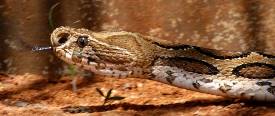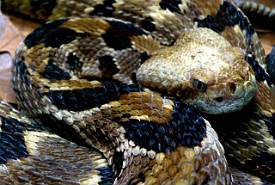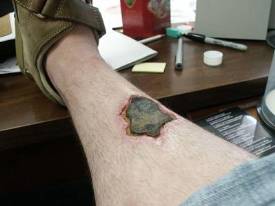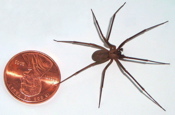Hemotoxin
Proteolytic poison
Online Biology Dictionary
|
|
 Russell's Viper (Daboia russellii), one of the deadliest
snakes in Asia, accounts for thousands of deaths each year.
Russell's Viper (Daboia russellii), one of the deadliest
snakes in Asia, accounts for thousands of deaths each year.Image: Saleem Hamee

Crotalus horridus
 Two-month-old brown recluse spider bite Image: Jeffrey Rowland
Two-month-old brown recluse spider bite Image: Jeffrey Rowland
A hemotoxin is a toxin that acts by lysing erythrocytes. Venoms of this kind have a proteolitic action. They produce swelling, cardiovascular damage, and eventual necrosis. They also disrupt blood clotting and, in the process of destroying the blood's functionality, severely damage internal organs and other body tissues, which can be extremely painful. The immediate cause of death in such cases is usually loss of blood pressure.
Hemotoxins are produced by a variety of animals, ranging from pit vipers, such as the Timber Rattlesnake (Crotalus horridus) or Russell's Viper (Daboia russellii), shown at right, to the brown recluse spider (Loxosceles reclusa).
Because poisons of this type break down not only blood cells but also other types of tissue, they aid snakes in digesting their prey, and in the case of spiders, assist in the extraction of fluids from the victim.
These poisons generally act more slowly than neurotoxins. While death from a neurotoxin (such as that of the Golden Poison Frog) can be immediate, humans bitten by a pit viper may take hours to develop severe symptoms. Tissue degeneration around a brown recluse bite takes place over a period of weeks.
Because toxins of this type act so slowly, a snake may be obliged to track a victim for some time before ingesting it. In many cases the prey are not dead, but rather overcome and limp with shock from the pain of the venom, when they are eaten.
There are approximately 500,000 snake bites to humans worldwide each year and about one quarter of those bites result in death. Generally speaking the chances of survival are lower with snakes that administer a neurotoxin because the chances of obtaining an antidote in time (if one exists) are lower.
If you are ever bitten, apply a tourniquet between the bite and your heart. Then lie still. Send someone else for a doctor or have them transport you to a doctor. Do not exert yourself.
A video about hemotoxinHemotoxin © Macroevolution.net
Most shared on Macroevolution.net:
Human Origins: Are we hybrids?
On the Origins of New Forms of Life
Mammalian Hybrids
Cat-rabbit Hybrids: Fact or fiction?
Famous Biologists
Dog-cow Hybrids
Georges Cuvier: A Biography
Prothero: A Rebuttal
Branches of Biology
Dog-fox Hybrids